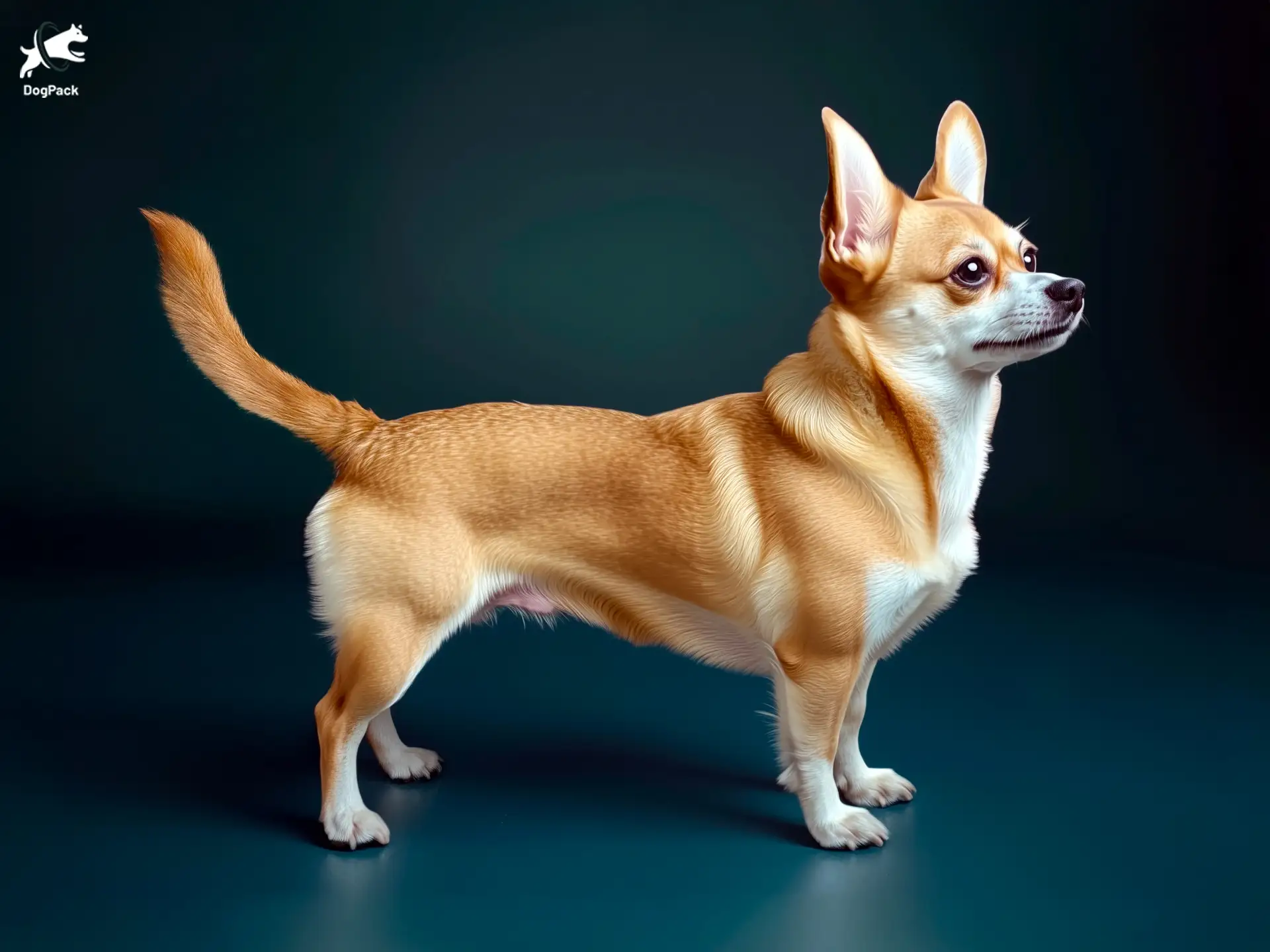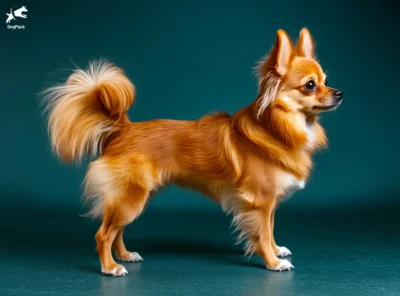Chigi Dog Breed Info & Overview
The Chigi, a charming blend of Chihuahua sass and Corgi playfulness, makes for an affectionate and lively companion. With their expressive eyes and perky ears, these compact dogs bring together the best of both breeds in a heart-stealing package. Known for their loyalty and spirited personality, Chigis are delightful pets that brighten up any home.
Characteristics
Pictures
Breed History
While the Chigi doesn’t boast a centuries-old lineage, this charming mix has been turning heads since designer breeds gained traction in the late 20th century. Breeders aimed to blend the Corgi’s friendliness with the Chihuahua’s spirited nature, resulting in the delightful Chigi.
The exact origins of the Chigi are a bit of a mystery, but it’s believed they first appeared in the United States. As crossbreeding grew in popularity, enthusiasts sought to create a small companion dog with a big personality—enter the Chigi.
Today, the Chigi remains a rare gem among hybrid breeds. Though not recognized by major kennel clubs, their unique blend of traits continues to win over those looking for an affectionate and lively companion.
Temperament, Personality
Chigis are known for their affectionate and lively personalities. They often inherit the Corgi’s sociable nature and the Chihuahua’s zest for life, making them spirited companions who love to be involved in family activities.
When it comes to children, the Chigi can be a wonderful playmate. They generally get along well with kids, especially if introduced at a young age. However, due to their small size, it’s important to supervise interactions to ensure gentle play.
Around other pets, the Chigi may display a bit of bossiness—thanks to their Chihuahua lineage. Early socialization is key to fostering harmonious relationships with other animals in the household.
Physical Characteristics
The Chigi is a small dog with a big presence. They often sport the Corgi’s elongated body and the Chihuahua’s expressive eyes. Their ears can be either erect like a Chihuahua’s or slightly flopped like a Corgi’s, adding to their unique appearance.
Coat types can vary, ranging from short and smooth to slightly longer and fluffy. Common coat colors include fawn, brown, black, and a mix of white markings. Their compact size makes them ideal for apartment living, but they carry themselves with the confidence of a much larger dog.
Despite their diminutive stature, Chigis have a sturdy build. They exhibit a charming blend of their parent breeds’ features, making each Chigi a one-of-a-kind companion.
Health Issues
Chigis are generally healthy, but they can inherit health issues common to their parent breeds. Dental problems are a concern, so regular teeth cleaning is essential. They may also be prone to patellar luxation, a condition affecting the kneecap.
Obesity can be an issue due to their small size and love for treats. Monitoring their diet and ensuring they get enough exercise can help keep your Chigi in top shape. Regular veterinary check-ups are crucial to catch any potential health issues early.
Heart conditions and hip dysplasia, although less common, can occur. Being aware of these possibilities allows for proactive care to ensure your Chigi leads a long, healthy life.
Grooming Needs
When it comes to grooming, the Chigi is relatively low-maintenance. Their coat shedding is moderate, so a weekly brushing session should suffice to keep their fur looking its best and reduce loose hair around the house.
Bathing can be done on an as-needed basis, typically every few months or when they get particularly dirty. Be cautious not to over-bathe, as it can strip natural oils from their skin. Nail trimming should be part of their routine to prevent overgrowth and discomfort.
Don’t forget about dental hygiene! Regular teeth brushing is important to prevent dental diseases common in small breeds. Ear checks and cleaning are also recommended to prevent infections.
Exercise Requirements
The Chigi has a moderate energy level and enjoys daily walks and playtime. A total of 30–60 minutes of exercise each day is usually sufficient to keep them happy and healthy. They love interactive games like fetch or tug-of-war.
While they appreciate outdoor activities, Chigis are also content with indoor play, making them suitable for apartment dwellers. Mental stimulation is just as important—puzzle toys and obedience training can keep their intelligent minds engaged.
Be mindful of extreme temperatures. Due to their small size, they can be sensitive to cold weather. In hotter climates, ensure they have access to shade and water during outdoor activities.
Training Tips
Training a Chigi can be a rewarding experience. They are intelligent and eager to please but may inherit a stubborn streak from their Chihuahua parent. Positive reinforcement methods work best—use treats and praise to motivate them.
Consistency is key. Short, regular training sessions will yield better results than occasional long ones. Early socialization is important to help them become well-rounded adults, comfortable with different people and environments.
Housebreaking may take some patience, but with persistence, your Chigi will catch on. Enrolling in a puppy training class can also provide valuable socialization opportunities and professional guidance.
Nutrition, Diet
Feeding your Chigi a high-quality dog food formulated for small breeds is essential. Due to their size and energy levels, they typically require about 1/2 to 1 cup of food per day, divided into two meals. Always consult with your vet to determine the exact portion sizes.
Be cautious with treats—they can quickly lead to weight gain in small dogs. Opt for healthy options like carrot sticks or specially formulated low-calorie dog treats. Ensure fresh water is always available.
Some Chigis may have food sensitivities, so monitor for any signs of allergies such as itching or gastrointestinal upset. If noticed, discuss dietary adjustments with your veterinarian.
Adoption, Breeders
If a Chigi—a charming Chihuahua and Corgi mix—has caught your eye, adoption is a wonderful place to start. Hybrid breeds often land in shelters or rescue groups waiting for a second chance at a loving home. Websites like Petfinder can help you locate adoptable Chigis in your area, and for more insights and connections, check out the Chigi Dog Lovers / Chihuahua & Corgi Mix Fan Page on Facebook!
If you decide to go through a breeder, research is key. Seek out reputable breeders who focus on health, temperament, and responsible practices. Ask for health clearances on both parent breeds to minimize potential health issues. A visit to the breeder’s facility will also provide a clearer picture of the environment in which the puppies are raised.
Steer clear of puppy mills or pet stores, which often prioritize profit over animal welfare. Responsible breeders are committed to the well-being of their dogs and are happy to answer your questions, ensuring your Chigi starts life on the right paw.
Family Pet?
Chigis make excellent family pets for those who understand their needs. Their affectionate nature means they bond closely with their human companions. They are generally good with children, especially when socialized early.
Due to their small size, they are suitable for apartment living and do well with seniors or singles. They enjoy being part of the family’s daily activities and can adapt to various lifestyles.
However, they may not appreciate rough play, so teaching children how to interact gently is important. With the right environment, a Chigi can be a delightful addition to any household.
Right For You?
If you’re looking for a small dog with a big personality, the Chigi might just be the perfect match. They are affectionate, adaptable, and bring a lot of joy into a home. Their moderate exercise needs make them suitable for both active individuals and those who prefer a cozy night in.
Consider your ability to provide the attention and care they require. Chigis thrive on companionship and may not do well if left alone for extended periods. If you can offer a loving home and the time they need, a Chigi could be your new best friend.
Before making a decision, spend time with Chigis or consult with owners to ensure this breed fits your lifestyle. They may be small, but their impact on your life will be anything but!
Conclusion
The Chigi is a delightful blend of charm and character, bringing together the best of the Chihuahua and Corgi breeds. Their affectionate nature and adaptability make them wonderful companions for a variety of households. If you’re ready for a loyal friend who will keep you entertained and loved, the Chigi might just be the perfect addition to your family.
FAQs
-
Are Chigis good with young children?
Chigis are generally good with children, especially if socialized early. Their small size requires gentle handling, so supervised interactions with younger kids help ensure positive experiences and prevent accidental injury.
-
How much grooming does a Chigi require?
Chigis have moderate grooming needs due to their double coat, which may shed seasonally. Weekly brushing helps keep their coat manageable and reduces shedding around the home, making grooming relatively easy.
-
Do Chigis enjoy mental stimulation activities?
Yes, Chigis benefit from mental stimulation and enjoy activities like puzzle toys, obedience games, and short training sessions. Engaging their minds helps prevent boredom and keeps them mentally sharp.
-
Are Chigis prone to weight gain?
Chigis can be prone to weight gain, especially if they inherit the Corgi’s appetite. A balanced diet and regular exercise help maintain a healthy weight, preventing potential health issues linked to obesity.
-
How adaptable are Chigis to temperature changes?
Chigis may be sensitive to extreme temperatures, especially due to their small size. They appreciate warm clothing in colder months and should avoid excessive heat, as they can overheat in hot weather.
Breed Ratings
Chigis are smart and eager to learn, especially when motivated with positive reinforcement.
This breed loves to play and enjoys interactive games with their family members.
With moderate energy, they enjoy daily walks but also appreciate cuddle time.
Shedding is moderate; regular brushing can help manage loose hair.
Generally low prey drive, but may chase small animals due to curiosity.
Low-maintenance grooming needs make them easy to care for.
Responsive to training with consistent, positive methods.
They prefer company and may experience separation anxiety if left alone too long.
Moderate tendency to bark, especially if not properly trained.
Minimal drooling makes them a tidy companion.
Can get along with other dogs if socialized early.
Generally healthy with few breed-specific issues when properly cared for.














